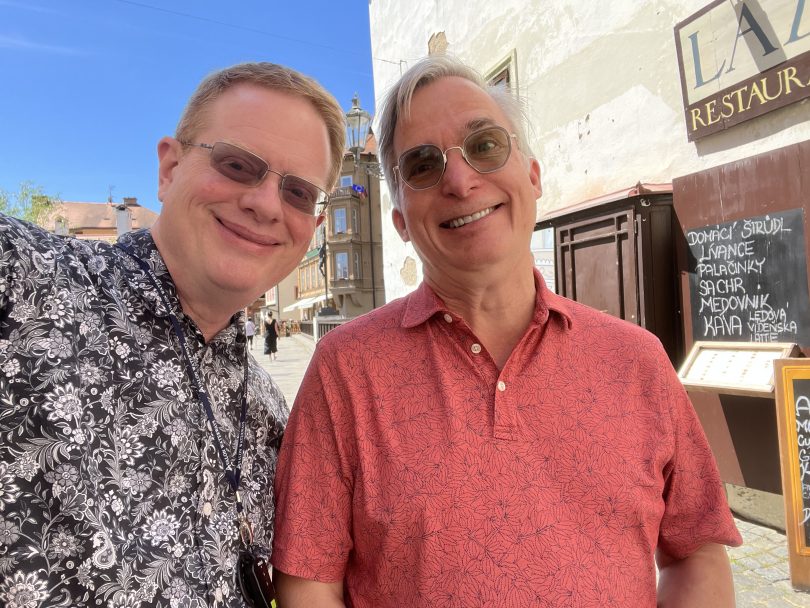I first saw Clyde at a movie night held by a tiny community church in Jackson, MS. As I watched him, I saw that he was the only one doing any work: setting up the video player and television, bustling around with the snacks, clearing away other people’s garbage. He said very little. He demanded (and received) no spotlight. He just got things done.
When I worked up the courage to ask him out, I suggested we rent a movie from my favorite video store. (As it turned out, he owned it.) As an alternative, I suggested we see a movie at the surprisingly good art theater in town. (It turned out he owned that, too.)
In the end, we just went to his house, sat on the couch, and talked. As we did, a huge, fluffy Persian cat sauntered out, brushed up against my leg, sprang up into my lap, and curled up there, purring loudly. Clyde went silent, and his eyes went large, as though he’d seen a ghost.
I froze in place. “What’s wrong?”
“That’s Lucy,” he said. “She’s terrified of everyone. She never comes out unless I’m the only one here. But it seems like she’s right at home with you.”

Before meeting Clyde, I was a bit of a mess.
I had made bad choices with a credit card, and was caught up in the financial slavery of paying minimum payments forever on a debt that was steadily growing due to high interest rates. I’d spent eight years locked in an unhealthy and co-dependent friendship, waiting for someone who had no interest in me at all to fall in love. I was lonely. After years of emotional, spiritual, and physical abuse at home, I was convinced that I was unloveable, and that I would spend my life alone.
Clyde changed all that. He taught me to be smarter, financially. For the first time, I felt someone could really see me — my flaws and shortcomings, but also my potential. At home, we always knew love could be snatched away if we said or did the wrong things; with Clyde, I experienced authentic, mutual, unconditional love for the first time.
We met in May. In October, I quit my job at the conservative seminary where I worked, left behind a church whose toxic faith I no longer shared, and moved in with Clyde.
The folks at the seminary were none too happy when the story got out that a respected teacher and well-known speaker had fallen in love with another man. They demanded that I come back, face the equivalent of a little church court, and answer their questions about my “deceptive and sinful ways.”
I simply told them, “No.”
They had no idea how to respond to that. No one had ever told them, “No.” They had never encountered a limit to their authority, or dealt with anyone who didn’t submit to that authority. In that moment, both they and I could see just how little power they really had.
Emboldened by Clyde’s love, I learned an important lesson: religious leaders have all the authority we hand them … and no more. It was a revelation that would change my life.

For our first seven years together, my family shut us out of their lives. There is more pain in those words than I can unpack here.
By contrast, Clyde’s family embraced us.
Clyde first took me to meet his parents at Christmas. We were half-way to their house when I asked, “What did your parents say when you said you were bringing me?”
He looked a little blank. “Actually … I don’t think I mentioned it.”
Those of you who don’t know Clyde will misread this as Clyde being either sneaky or ashamed. He is neither. Instead, he come comes from a family where guests do not have to be pre-approved … and he was so confident in his parents’ love that he couldn’t imagine them reacting with anything other than acceptance.
And this turned out to be the case. Joe, Clyde’s father, was elegant and friendly and bright. Joyce, Clyde,’s mother, was the soul of hospitality and grace. When she took us on a tour of the house — the very house we live in now, in fact — she drifted by the guest bedroom and said with no fanfare at all: “This is where you boys will sleep.” With just seven words, she defused all tensions about who we were to each other and whether or not that would be accepted.
Years passed. One day, Peyton, one of the nephews, sat down next to Clyde on the couch and, out of the blue, announced, “Mom says Mark is your partner.”
Clyde nodded. “Yes, that true.”
Peyton, all of nine years old, looked up at Clyde and said, “But what, exactly, does that mean?”
Clyde, without hesitation, said, “It’s like being best friends, and you love each other so much, you want to do everything together and be together all the time.”
Peyton nodded. “Cool.”
We were who we were from the very beginning of our time with Clyde’s family, and, through the magic of their acceptance, we were welcomed for who we were by virtually everyone in Clyde’s small Mississippi hometown. Over the next several years, our love for and connection to these people and this town grew in its depth and strength.
Being shut out of my birth family hurt me deeply, but being loved so completely by my family of choice gave me great joy. From this, too, I learned an important lesson: the people who truly love you will accept you for who you really are.
This revelation, too, changed my life.

With that, Clyde and I started a quiet but remarkable life together.
In those years, the news filled up with concerns about “the gay lifestyle.” Here was ours: we shared a home. We worked our jobs. We paid our taxes. We went to church. We attended birthdays, graduations, weddings, and funerals. We cultivated a circle of friends. We were deeply happy. It was difficult to understand how our “lifestyle” differed from that of any of the young couples around us.
We began to travel: to Thailand, to Singapore, to Hong Kong, to China, to Australia, to New Zealand, to Iceland. We invited Clyde’s parents along, and they invited the whole family along, and soon, the nine of us were globetrotting together: Paris, Bangkok, London, Buenos Aires, Edinburgh, Barcelona, Rome, Venice, Florence, Istanbul, Lisbon, and San Juan.
In Jackson, Mississippi — Jackson! Mississippi! — we were just as open about who we were to each other as any other married couple would be … and because we were comfortable with ourselves, the people around us were comfortable with us, too.
There were exceptions to this rule, of course — all pretty funny in their own way.
Once, when I worked at SkyTel, as I was telling a story about our trip to Hong Kong, a red-faced woman in an unflattering dress interrupted me. “You keep talking about ‘we’ did this and ‘we’ did that. Who’s the we?”
“That’s me and Clyde,” I said. “Now, when the waitress got to our table–“
“And who is Clyde?” she said, interrupting me again.
“My partner,” I said.
“Your partner,” she repeated, taking on the tone of a lawyer in a bad crime drama. “Your mean you have a business partner?”
“My life partner,” I said. “He’s my husband.”
These words drove her into a frenzy. “That’s what I can’t stand about you gay people!” she shouted. “The way you think you have to throw your private bedroom secrets in everyone’s faces!”
I’m still not exactly sure how being crossed-examined into saying I had a husband qualifies as divulging “bedroom secrets,” but there you go.
Another time, a male co-worker — a Baptist minister I knew to be uncomfortable with my having a husband — asked me to join him in his office. When he spoke, his voice was low and shaky. “So … you’re gay.”
“I am,” I said.
“And Clyde is … your partner,” he managed.
“He is.”
He drew a long breath. “Can I ask you a very personal question?”
Here we go, I thought. “Sure.”
“If he’s a man … and you’re a man … how do you …”
I held my breath. “Yes?
“If you’re both men, how do you decide who will clean the house and cook the meals and do the dishes and do the laundry? You know … the woman’s work?”
I almost laughed out loud — but stopped myself, because it was apparent that he had really wrestled with this question. “Well, we share the work, and each of us sort of leans into the things we really like to do.”
The idea seemed to strike him as revolutionary … and with that, he had no further questions.
And one day, years later, a woman at work said, “When I first heard you were with another man, I was a little uncomfortable about it. But after seeing you and Clyde together, and hearing how much you love him, and hearing about all he does for you, I found myself thinking, ‘Oh, my God! Who wouldn’t want that in their life?'” She wrung her hands in mock frustration. “I need a Clyde in my own life!”
I hope she found one.
She can’t have mine.

We prospered. Clyde’s sweet mother, Joyce, passed away, breaking everyone’s hearts. We moved to Atlanta. I went to work for the Federal Reserve, which recognized my marriage to Clyde before my own nation did. We became members of St. Mark United Methodist Church, where we made lifelong friends.
There, along with some of those friends (Bill, Matthew, John, Jeri, Turpin, and Michelle) we started teaching a remarkable class called “The Couples Class” — a Sunday School class open to any and all couples, looking at spiritual questions through the lens of couplehood.
It turned out that all of us — all these couples, whether we were gay or straight or interracial or new or long-term — had far more in common than we ever expected. We had the same struggles, the same joys, the same hopes, the same fears. We were just people in love who wanted to spend our lives together and worship God with the person God gave us to love.
It was from this experience, with Clyde at my side, that I learned another important lesson: I had been crazy to ever believe that a few hateful, fearful, ignorant church leaders had the authority to forbid me from marriage or ministry. It was absurd to believe, even for a minute, that anyone had the power to bar me from communion with and connection to the very God who promises that “neither death, nor life, nor angels, nor principalities, nor powers, nor things present, nor things to come, nor height, nor depth, nor any other creation shall be able to separate us from the love of God.”
This revelation, too, changed my life.
If you can embrace it, it will change yours.

Slowly, slowly, my family opened up to us again.
From our first days as a couple, Clyde had said that, despite all the harsh things my family said and did (and despite the fact that most of these things were directed at him), we should simply respond with love. He always followed this rule, and I followed it as often as I could.
Over many years, our decision to just love them worked its slow magic.
First came permission to make short, tense visits. Then we spent some holidays together. The more mother came to know Clyde, the more she liked him, especially since Clyde could fix anything around her house.
“Mark’s a good talker,” Mother would say. “But Clyde can actually do things.”
With time, my mother’s health began to decline. Clyde helped move her to a home two doors down from my brother’s house. And while Mike and his wife, Suzanne, bore the vast majority of the burden of her care, it was always ironic to me how often it was Clyde who could get mother to do the things that neither Mike nor I could persuade her to do.
On the day before mother died, she summoned us all into her bedroom. She was extraordinarily frail, a living skeleton taking labored breaths. She called for Clyde and said, “I’m so sorry. I know I’ve been so mean to you. I said and did terrible things. And now, I can’t even remember why I did them, or why I thought any of those things mattered. But now they don’t, and I’m sorry. I love you, Clyde, just like a son.”
There was a lesson in this, too: it may take years and a lot of heartache, but eventually, despite the pain …
… love wins.

Time went on. Clyde’s dad, Joe, who had seemed immortal and unstoppable, died, breaking all our hearts again. We moved from Atlanta to New Albany, Clyde’s hometown, to be closer to family. COVID ravaged the world and polarized our nation. We lived together in a tiny cabin in the woods while we renovated Joe’s house. We watched the snow fall in the pines and ice inch across the lake, and in the spring, we watched as the world (and the wasps in the cabin’s paper-thin walls) came back to life again.
Friends in Atlanta seemed shocked that we were moving to a small town — and especially a small town in Mississippi. “Given the political climate,” they said, “moving to a small town doesn’t seem like the wisest thing for a gay couple to do.”
To be honest, to some degree, I shared these concerns and trepidations. But let me tell you something: our life together in this small town has been magical. Since moving here, I’ve learned that small towns and the people in them are more complicated and wonderful and surprising than you would ever believe.
Are there some people here who readily declare their undying support for former President Trump? Yes. And many of those same people also readily declare their undying support for Clyde and for me, and I don’t doubt for a minute they would “whup the asses” of anyone who said anything against us.
Are there churches here who don’t think that Clyde and I are worthy of marriage or ministry, and that don’t want us in the congregation? Yes. And in that same church, there are people who have been kind enough and bold enough to stand up to ministers and church leaders and say, “Mark and Clyde belong here. Their lives bear the fruit of the Spirit, and that’s enough for us.”
Are there very few restaurant choices? Yes. And in every one of those, are we recognized by name, invited to join tables, and enjoying wonderful meals with family and friends? Absolutely … every day.
People here brag on the home we’ve created together. They delight in the stories about our travels together. They invite us to parties. They’ve made us feel at home. They accept us.
Some of this acceptance is due, of course, to the fact that they’ve always known and loved Clyde, and his parents, and his incredible sister, Patrice — and so, by extension, they know and love me. But some of this is also due to the fact that these are just good people, with good hearts, and they know that the community that binds us together is more powerful than the differences that might keep us apart.
There is a lesson in this: people are more complex than you might think, and if you give them a chance, they can surprise you.

Today, Clyde and I are celebrating thirty years together.
To those no longer with us: we remember you, and love you, and pray for you.
To my mother: I forgive you.
To our families: we are thankful for your love and support.
To our friends: we are grateful for your love.
To our town: we are so happy to be here, and so fortunate to have found a home in this remarkable place.
To our church: while some trials can be seen on the horizon, we have faith in the hearts of good people … and we believe that love will win.
To you, dear readers, who are kind enough to indulge my books and posts and photos and stories … I am grateful for your patient attention. The moments of our lives are a limited commodity, and I will never take your gift of a few of those moments for granted.
And to Clyde, the love of my life, my north star, my stable rock, my teacher, my champion, my helper, my partner, my husband, my best friend: I love you completely, I treasure every day and every memory, and I look forward to all our upcoming adventures.
My greatest joy is that I found you, my greatest accomplishment is the life we’ve built together, and my greatest wish is for more time to appreciate and enjoy the wonderful person you are.
Happy anniversary, little monkey.



